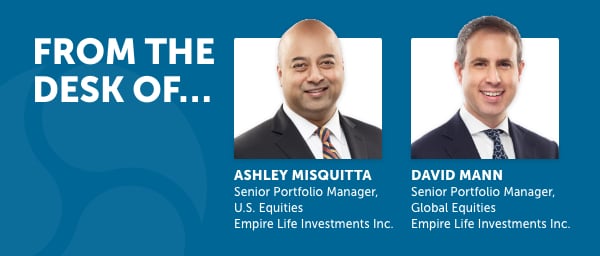
From the Desk of Ashley Misquitta and David Mann: In this recent article, the portfolio managers discuss the evolution of sustainable investing and its growing popularity among investors. Ashley and David also share how they incorporate ESG factors into their investment process.
Since 1923, Empire Life has been committed to helping our clients achieve their financial goals. For our investment business, this means delivering attractive investment returns for our clients over the long term. We also understand that for an increasing number of clients, sustainability is an important consideration in conjunction with investment performance.
Some readers may be asking “what is sustainable investing”? You may be more familiar with the origins of sustainable investing; those socially responsible investments (SRI) that excluded companies whose products or services violated various ethical values (drinking, smoking, and gambling as examples).
The evolution of sustainable investing over the past decade led to a shift in focus from subjective ethical values to approaches considering sustainability’s effect on economic value.
The evolution of sustainable investing over the past decade led to a shift in focus from subjective ethical values to approaches considering sustainability’s effect on economic value. The broadest of these modern approaches incorporates financially material Environmental, Social and Governance (ESG) factors into the investment decision making process. It adopts a longer term (sustainable) view of ownership and results in a more stakeholder approach to investing. It does not replace more
traditional financial considerations (such as competitive advantage, profitability, and quality of management), but it is best considered as a compliment. Other approaches to modern sustainable investing include best-in-class screening, active ownership and engagement, thematic investing (low carbon, diversity as examples), and impact investing where positive and measurable environmental or societal changes take precedent over financial performance.
What are ESG factors?
What are ESG factors? Environmental factors include among other things, climate change, waste and pollution, deforestation and sustainable approaches to energy use. Social factors can include topics such as product safety, social equality, access to healthcare and diversity at work. Governance tackles broad issues including ethical business practices, executive pay, board diversity and shareholder rights.
Interest in sustainable investments has grown notably in Canada and globally over the past few years, as shown in the following chart. Last year’s spike in sustainable fund flows may have been sparked by the global pandemic, which brought issues to the fore such as environmental encroachment (increasing risks of zoonotic disease), workplace safety, access to health care, supply chain risks, and social inequalities.

At Empire Life, we have long believed that corporate responsibility and a sustainable approach to business operations are important indicators of quality. We also believe that strong corporate governance aligns management and shareholder interests, and that analyzing environmental and social factors can assist in identifying business models that may create sustainable value while reducing risk.
We believe that the most effective way to incorporate ESG factors into an investment process over the long term is for investment teams themselves to research ESG factors and consider them alongside other inputs into the investment process. This aligns well with our focus on identifying high-quality, well-managed companies that trade at attractive valuations and also have strong growth prospects. The investment teams can then choose how best to apply all the tools of active management to their respective asset class or strategy, whether that is to engage or ultimately to sell a security when it no longer offers an attractive risk-adjusted potential return.
ESG factors must be considered alongside other key quantitative and qualitative factors to determine financial materiality.
ESG factors must be considered alongside other key quantitative and qualitative factors to determine financial materiality. Our investment team will access ESG data sources, and incorporate that research into their bottom-up, fundamental analysis, and from insights we gather from engaging directly with management teams. Our portfolio managers and analysts engage on ESG topics as part of their ongoing dialogue with company management.
We monitor the progress we are making and are continuously enhancing the incorporation of ESG factors into our investment processes. This monitoring includes the effect of ESG analysis on portfolio performance, ESG scoring of individual securities, as well as for the funds overall. Given the dynamic and evolving nature by which ESG factors are material to investment performance, we are committed to continued innovation and improvement.
With this commitment to innovation in mind, we are pleased to announce the recent launch of the Empire Life Global Sustainable Equity GIF. This fund provides our customers the diversification and growth potential of the global stock market, combined with a structural focus and increased emphasis on ESG opportunities and risk management.
We thank you for your continued support.
Ashley Misquitta and David Mann
This article includes forward-looking information that is based on the opinions and views of Empire Life Investments Inc. as of the date stated and is subject to change without notice. This information should not be considered a recommendation to buy or sell nor should they be relied upon as investment, tax or legal advice. Information contained in this report has been obtained from third party sources believed to be reliable, but accuracy cannot be guaranteed. Empire Life Investments Inc. and its affiliates do not warrant or make any representations regarding the use or the results of the information contained herein in terms of its correctness, accuracy, timeliness, reliability, or otherwise, and do not accept any responsibility for any loss or damage that results from its use.
Past performance is no guarantee of future performance.
Empire Life Investments Inc., a wholly owned-subsidiary of The Empire Life Insurance Company, is the Manager of Empire Life Mutual Funds and the Portfolio Manager of Empire Life Segregated Funds. The units of the Funds are available only in those jurisdictions where they may be lawfully offered for sale and therein only by persons permitted to sell such units. Commissions, trailing commissions, management fees and expenses all may be associated with mutual fund and segregated fund investments. Any amount that is allocated to a Segregated Fund is invested at the risk of the contract owner and may increase or decrease in value. A description of the key features of the individual variable insurance contract is contained in the Information Folder for the product being considered. Segregated Fund policies are issued by The Empire Life Insurance Company.
April 2021

